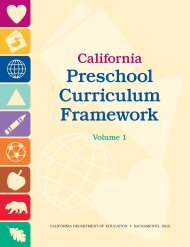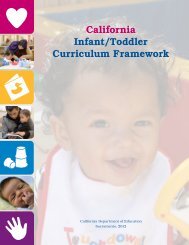California Preschool Learning Foundations - ECEZero2Three ...
California Preschool Learning Foundations - ECEZero2Three ...
California Preschool Learning Foundations - ECEZero2Three ...
Create successful ePaper yourself
Turn your PDF publications into a flip-book with our unique Google optimized e-Paper software.
trayal that is consistent with conclusions<br />
from other foundations. Older<br />
three-year-olds have developed a number<br />
of social skills for interacting competently<br />
with familiar adults—including<br />
developing abilities to engage in<br />
simple conversations, enjoy other<br />
shared activities, and cooperate with<br />
requests or instructions—and they<br />
can exercise these skills particularly<br />
in familiar and comfortable settings.<br />
Older four-year-olds are not only more<br />
advanced in most of these social skills<br />
but also take greater active initiative in<br />
interacting with familiar adults. Based<br />
on these conclusions, most children<br />
are becoming prepared for the variety<br />
of social encounters that will characterize<br />
their experience in kindergarten<br />
and the primary grades.<br />
Interactions with Peers<br />
It was not so long ago that developmental<br />
researchers and practitioners<br />
underestimated the peer social skills<br />
of young children, interpreting episodes<br />
of conflict to reflect preschoolers’<br />
egocentrism and limited social interest.<br />
With the growing experience of<br />
young children in preschool and early<br />
childhood settings, researchers have<br />
rethought peer interactions and have<br />
discovered that they are far more<br />
complex, sophisticated, and multifaceted<br />
than earlier believed. This<br />
discovery is consistent with the developmental<br />
accomplishments described<br />
in the other foundations. As preschoolers<br />
achieve considerable insights into<br />
others’ thoughts and feelings through<br />
their growth in “theory of mind,” for<br />
example, they are capable of greater<br />
cooperation with other children and<br />
more adept at using conflict resolution<br />
strategies.<br />
<strong>California</strong> Department of Education • <strong>Preschool</strong> <strong>Learning</strong> <strong>Foundations</strong>, Volume 1<br />
The development of social skills with<br />
peers is also important to the growth of<br />
school readiness. A number of studies<br />
have shown that the peer experiences<br />
of children in kindergarten and the<br />
primary grades are an important predictor<br />
of children’s academic success<br />
and school adjustment. Children who<br />
experience greater peer acceptance<br />
and positive peer relationships tend<br />
to feel more positively about coming<br />
to school, participate more in classroom<br />
activities, and achieve more in<br />
the classroom (Buhs and Ladd 2001;<br />
Ladd, Birch, and Buhs 1999; Ladd,<br />
Kochenderfer, and Coleman 1996,<br />
1997; O’Neil and others 1997).<br />
The period of ages three to five<br />
years is a particularly significant one<br />
for the growth of social skills with<br />
peers, and these foundations illustrate<br />
the multifaceted ways in which<br />
peer relationships evolve during this<br />
time (see reviews of this research by<br />
Rubin, Bukowski, and Parker [2006]<br />
and Rubin and others [2005]). Young<br />
children initially acquire greater skill<br />
and confidence in interacting with<br />
other children in playgroups of two or<br />
three; later, they do so in larger, wellcoordinated<br />
peer groups. Among the<br />
important achievements of the later<br />
preschool period is the ability to initiate<br />
peer sociability and smoothly join<br />
others in play; to cooperatively and<br />
spontaneously share with others; to<br />
coordinate one’s behavior with that of<br />
one or more other children; to communicate<br />
in ways that other children<br />
can understand; and to spontaneously<br />
enlist procedures (such as turn-taking)<br />
that reduce the chance of peer conflict<br />
(Howes 1987, 1988; Vandell, Nenide,<br />
and Van Winkle 2006).<br />
27<br />
SOCIAL-EMOTIONAL DEVELOPMENT
















